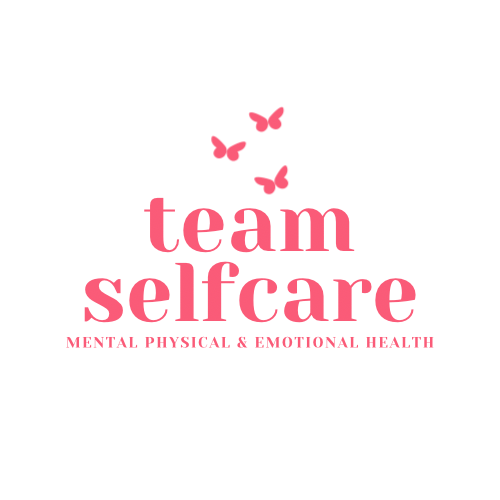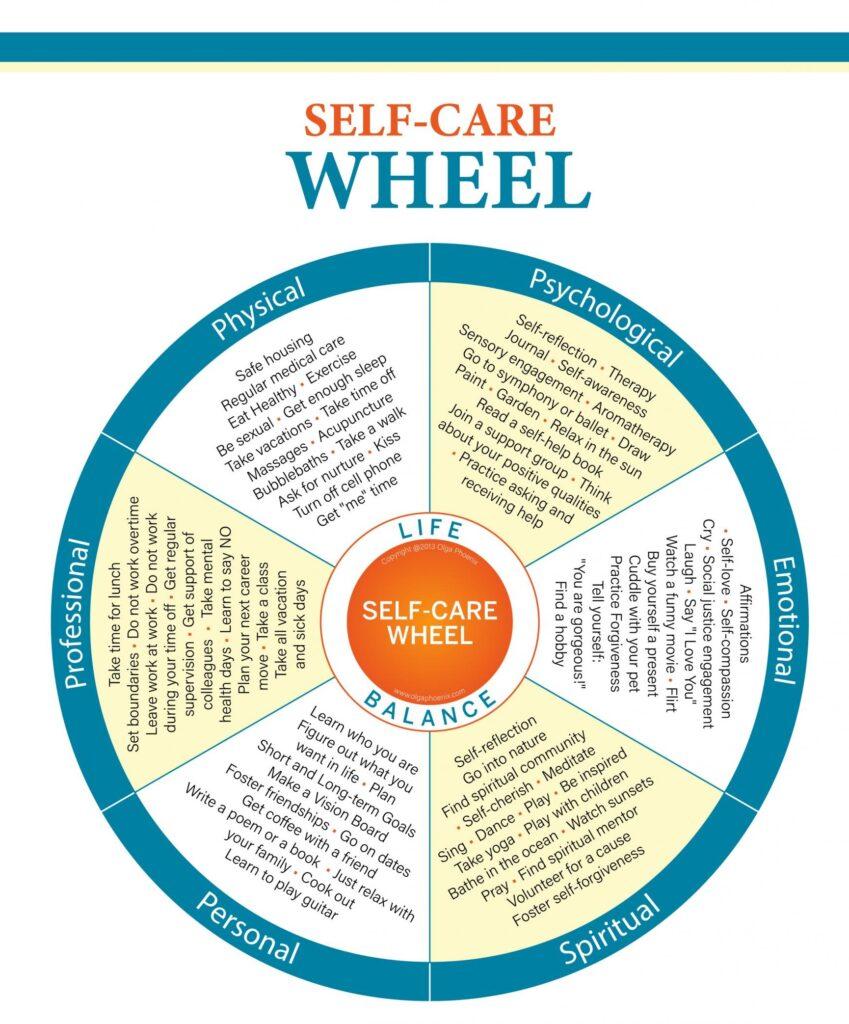
In the relentless pursuit of entrepreneurial success, one often overlooked element stands as a crucial cornerstone: self-care. For entrepreneurs navigating the tumultuous waters of business, the concept of self-care might seem like a luxury reserved for those with copious free time. However, the truth is quite the opposite. Self-care is not an indulgence; it’s an essential investment in your well-being and your business’s sustainability.
In this featured article, we’ll delve into the significance of self-care for entrepreneurs and introduce a powerful tool to help you cultivate a sustainable self-care routine – the Self-Care Wheel Toolkit. At its core lies a valuable instrument: the Self-Care Assessment Tool, designed to help you understand and enhance your self-care practices across six critical dimensions of life. Whether you’re a seasoned business owner or just starting your entrepreneurial journey, this article will shed light on the path to lasting success through self-care assessment and improvement.
The Entrepreneurial Lifestyle: Challenges and Demands
Entrepreneurship, often romanticized for its independence and potential for financial reward, comes with a set of unique challenges and demands that can take a toll on even the most resilient individuals.
Unique Stressors and Demands:
Entrepreneurs face a myriad of stressors that set them apart from conventional employment. The responsibility for the entire enterprise rests on their shoulders, from financial management and decision-making to dealing with unforeseen crises. The pressure to innovate, stay competitive, and adapt to rapidly changing markets is relentless. These demands can lead to a constant state of high alert, where stress becomes a constant companion.
Prevalence of Burnout and Its Consequences:
It’s no surprise, then, that burnout is a significant concern among entrepreneurs. Burnout is characterized by chronic exhaustion, cynicism, and reduced professional efficacy. The drive to succeed can inadvertently push entrepreneurs to neglect their well-being, which can have severe consequences for both personal health and business performance. Burnout not only compromises physical and mental health but can also lead to poor decision-making, strained relationships, and even business failure.
Emphasis on the Need for a Structured Self-Care Routine:
Given the unique challenges and heightened demands of the entrepreneurial journey, it becomes clear that self-care is not just an option but a necessity. A structured self-care routine is like a lifeline in the turbulent sea of entrepreneurship. It’s not about indulgence; it’s about preserving your physical and mental well-being to ensure long-term success.
Without proper self-care, entrepreneurs risk burnout, diminishing their ability to lead, innovate, and adapt. In this article, we’ll explore how a structured self-care routine, bolstered by the Self-Care Assessment Tool in the Self-Care Wheel Toolkit, can be your shield against burnout and a key to achieving sustainable success in the competitive world of entrepreneurship.
The Self-Care Assessment Tool
Now that we’ve established the critical role of self-care in an entrepreneur’s journey, let’s dive into the practical side of things. The Self-Care Assessment Tool, a pivotal component of the Self-Care Wheel Toolkit, is your compass on the path to self-care enlightenment.
Description of the Self-Care Assessment Tool:
Imagine this tool as a mirror reflecting your current self-care practices across various dimensions of your life. It’s not just a questionnaire; it’s a self-discovery mechanism that offers valuable insights into how well you’re taking care of yourself. This assessment is a cornerstone of the toolkit, designed to guide you toward creating a sustainable self-care routine tailored to your unique needs.
Purpose of the Assessment:
The primary purpose of the Self-Care Assessment Tool is to bring clarity and self-awareness to your self-care journey. It’s a self-reflection exercise that helps you gauge where you stand in terms of self-care practices. By answering a series of thought-provoking questions, you’ll gain a deeper understanding of your current self-care habits, both strengths and areas that need improvement.
Walking Readers Through the Assessment Process:
The assessment process is straightforward and insightful. You’ll be prompted to reflect on various aspects of your life and self-care practices honestly. As you answer the questions, it’s essential to be candid with yourself; after all, this is a tool for your personal growth and well-being.
Six Areas of Life Covered by the Tool:
The Self-Care Assessment Tool comprehensively covers six key areas of life, each representing a vital facet of your well-being:
- Physical: This dimension encompasses your physical health, exercise, and nutrition. It evaluates how well you’re taking care of your body.
- Psychological: Here, you’ll explore your mental and cognitive well-being. It delves into your thought patterns, stress management, and resilience.
- Emotional: Emotional self-care involves understanding and managing your feelings, fostering emotional resilience, and nurturing positive emotions.
- Spiritual: This area addresses your sense of purpose, values, and connection to something greater than yourself. It explores your inner beliefs and spiritual practices.
- Personal: Personal self-care relates to your personal growth, interests, and hobbies. It’s about nurturing your passions and maintaining a work-life balance.
- Professional: Lastly, professional self-care assesses your work-related well-being. It involves your career goals, time management, and boundary-setting in your professional life.
By evaluating these six dimensions, the Self-Care Assessment Tool provides a holistic view of your current self-care practices. It serves as the first step in your journey towards creating a sustainable self-care routine tailored to your unique needs and aspirations. In the following sections, we’ll explore how you can leverage the insights gained from this assessment to transform your entrepreneurial journey and enhance your overall quality of life.
The Benefits of Self-Care Assessment for Entrepreneurs
Now that we’ve introduced the Self-Care Assessment Tool and its comprehensive coverage of the six key areas of life, let’s delve into the invaluable benefits it offers to entrepreneurs on their journey toward sustainable success.
Improved Self-Awareness:
One of the fundamental advantages of the Self-Care Assessment Tool is its ability to enhance self-awareness. As entrepreneurs, it’s easy to get caught up in the whirlwind of daily operations and the pursuit of business goals, often losing sight of our own well-being. The assessment serves as a mirror, reflecting back an honest image of our current self-care practices. It helps us see where we’re excelling and where we may be falling short.
Through this heightened self-awareness, entrepreneurs can gain a clearer understanding of how their self-care habits impact their overall health, productivity, and fulfillment. This newfound insight forms the foundation for positive change and lays the groundwork for a more balanced and fulfilling life.
Identifying Areas of Neglect:
The assessment is like a spotlight, illuminating areas of neglect that may have gone unnoticed. It pinpoints specific dimensions of self-care that require attention and improvement. By identifying these areas, entrepreneurs can address potential sources of stress, burnout, or unhappiness before they become insurmountable challenges.
Creating a Customized Self-Care Plan:
Armed with the insights from the assessment, entrepreneurs can take proactive steps to create a personalized self-care plan. This plan is not one-size-fits-all; it’s tailored to your unique needs, goals, and circumstances. If the assessment reveals a deficiency in physical self-care, for instance, you might set goals to incorporate regular exercise and healthier eating habits into your routine. If psychological self-care is lacking, you might explore stress management techniques or seek professional support.
The key here is that your self-care plan is based on your assessment results, ensuring that it addresses the specific areas that require attention. This personalized approach is far more effective than adopting generic self-care practices, as it aligns with your individual well-being goals.
Measuring Progress and Success:
Finally, the Self-Care Assessment Tool serves as a valuable baseline against which to measure progress and success. After implementing your personalized self-care plan, you can periodically revisit the assessment to gauge how your self-care practices have evolved. This ongoing assessment allows you to track improvements over time and make adjustments as needed.
Entrepreneurship is a journey, and so is self-care. By using the assessment as a measuring stick, you can quantify the positive impact of your self-care efforts on both your personal well-being and professional success.
In the following sections, we’ll explore practical strategies for implementing and sustaining your self-care routine, taking into account the insights gained from the assessment. Remember, self-care isn’t a luxury; it’s a strategic investment in your entrepreneurial journey and your overall quality of life.
The Self-Care Wheel: A Holistic Approach
Now that we’ve established the significance of self-care assessment and its benefits, let’s explore a holistic framework that will guide you in addressing all dimensions of your well-being: the Self-Care Wheel. This dynamic tool is an essential part of the Self-Care Wheel Toolkit and is designed to help you achieve balance and fulfillment across various areas of your life.
Introduction to the Self-Care Wheel:
The Self-Care Wheel is a visual representation of your life’s different facets, each representing a critical dimension of your overall well-being as mentioned above. By focusing on these areas, you can achieve a well-rounded and sustainable self-care routine.
The Importance of Addressing All Dimensions:
The Self-Care Wheel is about balance and synergy. Neglecting any one of these dimensions can lead to an imbalance that affects your overall well-being. For instance, relentless focus on the professional dimension, while ignoring physical or emotional self-care, can eventually lead to burnout.
By addressing all areas, you create a harmonious and sustainable self-care routine that supports not only your entrepreneurial success but also your overall quality of life. Remember, achieving success in your business is just one piece of the puzzle; a well-rounded and fulfilled life requires attention to each of these dimensions.
Examples of Self-Care Activities:
To give you a sense of how to approach self-care in each dimension, here are some practical examples of self-care activities:
- Physical: Regular exercise, balanced nutrition, getting enough sleep, staying hydrated, and scheduling regular health check-ups.
- Psychological: Mindfulness meditation, journaling, practicing stress-reduction techniques, and seeking therapy or counseling when needed.
- Emotional: Cultivating emotional intelligence, practicing self-compassion, nurturing positive relationships, and setting healthy boundaries.
- Spiritual: Engaging in meditation or prayer, spending time in nature, exploring your personal values, and volunteering or giving back to your community.
- Personal: Pursuing hobbies and interests outside of work, taking regular breaks, practicing relaxation techniques, and investing in self-improvement.
- Professional: Time management and goal setting, setting clear boundaries between work and personal life, seeking professional development opportunities, and regularly reassessing your career path.
In the upcoming sections, we’ll explore how to integrate these self-care activities into your daily routine, leveraging the insights gained from the Self-Care Assessment Tool to create a sustainable and fulfilling entrepreneurial journey.
Implementing Sustainable Self-Care
Now that we understand the importance of a holistic approach to self-care through the Self-Care Wheel, it’s time to explore practical strategies for implementing and sustaining self-care in your entrepreneurial life. Sustainable self-care is not about short-term fixes; it’s about creating lasting habits that support your well-being. Let’s delve into how you can achieve this.
Building Healthy Habits:
Incorporating self-care into your daily routine starts with building healthy habits. Here are some tips to help you make self-care a consistent part of your life:
- Start Small: Begin with manageable self-care activities that don’t overwhelm your schedule. Gradually build up to more complex practices.
- Consistency is Key: Create a daily or weekly self-care schedule and stick to it as closely as possible. Consistency helps turn self-care into a habit.
- Set Reminders: Use digital tools or physical reminders to prompt self-care activities. This can help you stay on track, especially when life gets hectic.
- Integrate Self-Care into Existing Routines: Find ways to weave self-care activities into your existing daily routines. For example, practice mindfulness during your morning commute or take a short walk during lunch breaks.
- Accountability: Share your self-care goals with someone you trust, like a friend or family member, who can help keep you accountable.
Setting Realistic Goals:
Setting achievable self-care goals is crucial for long-term success. Here’s why it matters:
- Avoid Overcommitting: Be realistic about the time and energy you can allocate to self-care. Overcommitting can lead to frustration and burnout.
- Break It Down: Divide larger self-care goals into smaller, manageable steps. Celebrate your progress along the way to stay motivated.
- Adapt and Adjust: Life is dynamic, and circumstances change. Be flexible in adjusting your self-care goals as needed to suit your evolving needs and priorities.
Time Management and Prioritization:
Entrepreneurs often grapple with busy schedules, but carving out time for self-care is essential. Here’s how you can make it happen:
- Prioritize Self-Care: Recognize that self-care is not a luxury but a necessity for your well-being and business success. Place it on your priority list.
- Block Time: Dedicate specific time slots for self-care activities in your calendar. Treat them as non-negotiable appointments.
- Delegate and Outsource: In your professional life, delegate tasks that can be handled by others, freeing up time for self-care.
- Practice the Two-Minute Rule: If a self-care activity takes less than two minutes to complete, do it immediately. This can help you address small self-care tasks without feeling overwhelmed.
Seeking Support and Accountability:
Don’t embark on your self-care journey alone; seek support and accountability:
- Involve Others: Share your self-care goals with friends, family, or a mentor who can offer encouragement and support.
- Join a Group: Consider joining a self-care or wellness group where you can connect with like-minded individuals who share similar goals.
- Professional Help: If needed, seek guidance from a therapist, life coach, or wellness expert who can provide personalized support and accountability.
By incorporating these strategies into your daily life, you’ll not only make self-care a sustainable habit but also bolster your ability to navigate the challenges of entrepreneurship with resilience and well-being. In the next section, we’ll explore real-life case studies of successful entrepreneurs who have transformed their lives through self-care, offering inspiration and insights for your own journey.
Overcoming Common Challenges
Implementing self-care, especially as an entrepreneur, comes with its share of challenges. Recognizing and addressing these challenges is essential for maintaining a sustainable self-care routine. Let’s explore some common obstacles entrepreneurs face and strategies to overcome them.
1. Time Constraints:
Challenge: Entrepreneurs often feel they don’t have enough time for self-care due to their busy schedules.
Solution: Prioritize self-care by scheduling it into your day, just as you would a business meeting. Start with small, time-efficient self-care practices that can be seamlessly integrated into your routine, like short mindfulness exercises, stretching breaks, or quick relaxation techniques.
2. Guilt and Overcommitment:
Challenge: Entrepreneurs may feel guilty or overcommit to work, neglecting self-care in the process.
Solution: Shift your perspective. Understand that self-care isn’t selfish; it’s an investment in your well-being and productivity. Set boundaries to protect your self-care time and learn to say no when necessary. Delegate tasks that others can handle, freeing up your time for self-care.
3. Lack of Support:
Challenge: Some entrepreneurs lack a support system or feel isolated in their journey.
Solution: Seek out a support network of like-minded individuals. Join local or online entrepreneur groups, attend networking events, or consider hiring a coach or mentor who can provide guidance and accountability. Connecting with others who understand the entrepreneurial journey can be incredibly valuable.
4. Perfectionism:
Challenge: Entrepreneurs often strive for perfection in their work, which can lead to neglecting self-care.
Solution: Shift your mindset from perfectionism to excellence. Recognize that taking care of yourself is part of achieving excellence in your work. Understand that self-care doesn’t require perfection; it requires consistency and effort.
5. Fear of Falling Behind:
Challenge: Entrepreneurs may fear that taking time for self-care will lead to falling behind in their business.
Solution: Consider self-care as a strategic investment in your business’s long-term success. When you prioritize your well-being, you enhance your productivity, creativity, and decision-making abilities. A well-cared-for entrepreneur is better equipped to face challenges and make sound decisions.
6. Lack of Self-Care Knowledge:
Challenge: Some entrepreneurs may not know where to start with self-care or what activities would benefit them most.
Solution: Educate yourself about self-care by exploring different self-care practices, attending workshops, or seeking guidance from professionals. Experiment with various self-care activities to discover what resonates with you and brings the most benefit.
7. Inconsistent Routine:
Challenge: Maintaining a consistent self-care routine can be difficult amidst the unpredictability of entrepreneurial life.
Solution: Flexibility is key. If your schedule varies, adapt your self-care routine accordingly. Focus on creating a self-care toolbox with a variety of practices that can be adjusted to fit your needs on any given day.
8. Financial Constraints:
Challenge: Some entrepreneurs may feel they can’t afford self-care activities.
Solution: Self-care doesn’t always require spending money. Many self-care practices, like mindfulness, journaling, or exercise, are low-cost or free. If finances allow, allocate a budget specifically for self-care activities that you value most.
Overcoming these common challenges requires a combination of mindset shifts, time management strategies, and a commitment to your well-being. By addressing these obstacles head-on, you’ll be better equipped to establish and maintain a sustainable self-care routine that supports your entrepreneurial journey and overall quality of life.
Measuring ROI: How Self-Care Impacts Entrepreneurial Success
Self-care is often viewed as a personal endeavor, but its impact on entrepreneurial success extends far beyond personal well-being. To fully appreciate the value of self-care in the business world, it’s essential to consider both its tangible and intangible benefits, supported by statistics and data.
Tangible Benefits:
- Enhanced Productivity: Entrepreneurs who prioritize self-care report higher levels of productivity. According to a study by the Harvard Business Review, individuals who practice self-care are more focused, better at time management, and able to accomplish tasks efficiently.
- Improved Decision-Making: Self-care practices like mindfulness and relaxation contribute to better decision-making. In a survey conducted by the McKinsey Quarterly, executives who engaged in regular mindfulness practices reported improved decision-making abilities and reduced decision fatigue.
- Lower Healthcare Costs: Entrepreneurs who neglect self-care are more likely to experience health issues, leading to higher healthcare costs. According to the World Health Organization, businesses that invest in employee well-being programs see reduced absenteeism and lower healthcare expenses.
Intangible Benefits:
- Enhanced Resilience: Self-care fosters emotional resilience, enabling entrepreneurs to better weather the inevitable challenges of business. A study published in the Journal of Applied Psychology found that individuals who practice self-care are more emotionally resilient and better equipped to handle stress.
- Creativity and Innovation: Self-care activities that promote relaxation and downtime, such as meditation and leisure, have been linked to increased creativity and innovation. Innovative thinking is a valuable asset in the business world.
- Better Work-Life Balance: Entrepreneurs who prioritize self-care often achieve a healthier work-life balance. This balance is essential for long-term sustainability and preventing burnout. Companies that encourage work-life balance report higher employee satisfaction and retention rates.
Statistics and Data:
- Employee Engagement: According to Gallup’s State of the Global Workplace report, engaged employees are 17% more productive, resulting in higher profitability for businesses. Self-care initiatives can boost employee engagement by promoting well-being and reducing burnout.
- Return on Investment (ROI): Research by the Health Enhancement Research Organization (HERO) found that for every dollar invested in employee well-being programs, there was a return of $1.50 to $4.90 in reduced healthcare costs and increased productivity. Entrepreneurs who invest in their own well-being can expect similar ROI.
- Entrepreneurial Success Stories: Countless entrepreneurs attribute their success to self-care practices. For instance, leaders like Richard Branson and Arianna Huffington have spoken about the role of self-care in their achievements. These success stories underscore the profound impact self-care can have on entrepreneurial journeys.
In summary, the evidence is clear: self-care isn’t just a personal indulgence; it’s a strategic investment in entrepreneurial success. The tangible benefits of enhanced productivity and decision-making, coupled with the intangible advantages of resilience and work-life balance, collectively contribute to improved business outcomes. The statistics and data support what successful entrepreneurs have long known – prioritizing self-care pays dividends in both personal and professional realms.
Conclusion
In the fast-paced and demanding world of entrepreneurship, self-care isn’t just a luxury; it’s your secret weapon for achieving long-term success and well-being. Throughout this article, we’ve explored the critical role self-care plays in the life of an entrepreneur, from understanding the challenges you face to implementing sustainable self-care practices. Now, let’s recap the key takeaways and encourage you to take action.
Recap of Importance:
Entrepreneurship is a rewarding journey, but it’s also one laden with unique challenges and demands. The prevalence of burnout and the toll it takes on both personal and professional life is a stark reminder of the importance of self-care. By prioritizing self-care, you invest in your physical and mental health, creativity, productivity, and resilience. It’s the foundation upon which entrepreneurial success is built.
Take Action:
It’s not enough to understand the significance of self-care; you must take action. The Self-Care Assessment Tool introduced earlier in this article is a valuable starting point. Assess your current self-care practices honestly and reflect on the insights it provides. Identify areas that need improvement and create a personalized self-care plan.
Embrace Sustainability:
Remember that self-care is a long-term commitment, not a short-lived trend. Embrace sustainability by building healthy habits, setting realistic goals, managing your time effectively, and seeking support from your network. Your self-care routine should evolve with you, adapting to your changing needs and priorities.
As you embark on this journey of self-care, keep in mind that you’re not alone. Many successful entrepreneurs have walked this path before you, recognizing that self-care isn’t a detractor from success; it’s a catalyst for it. It’s the key to maintaining your passion, creativity, and resilience throughout your entrepreneurial journey.
In conclusion, we encourage you to assess your own self-care practices today. Take the first step toward a more balanced, fulfilled, and sustainable life as an entrepreneur. Remember, success isn’t just about achieving your business goals; it’s about thriving in all aspects of life. Your well-being is the foundation upon which you’ll build your entrepreneurial empire, and it’s worth every investment you make.




